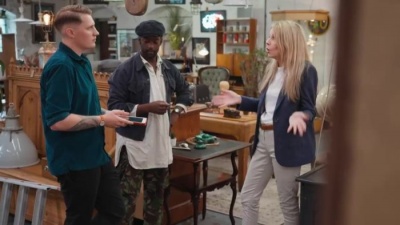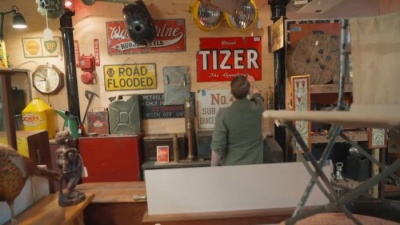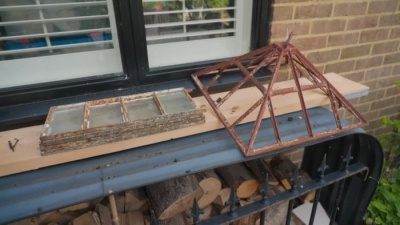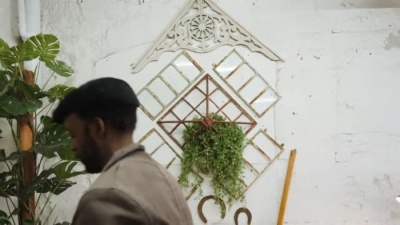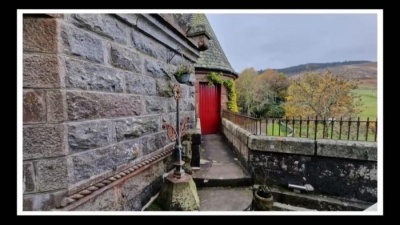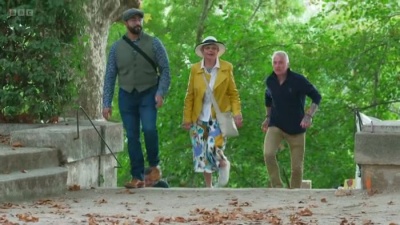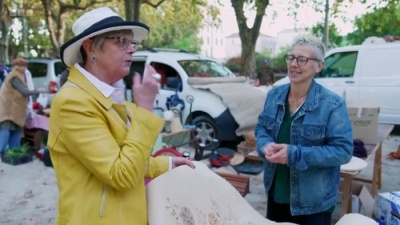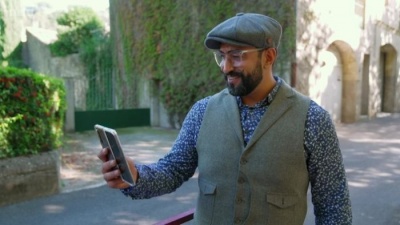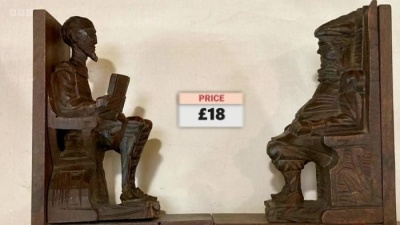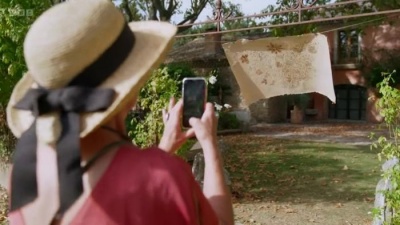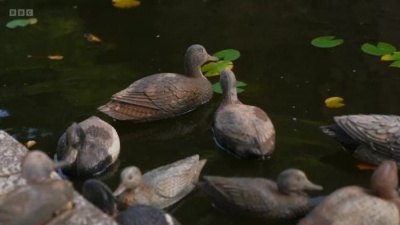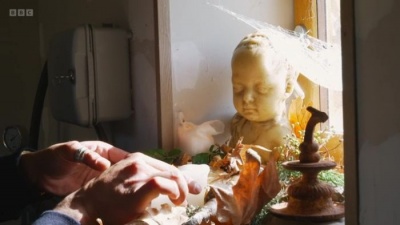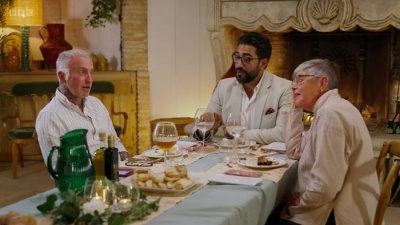Weaver's Week 2023-10-22
Last week | Weaver's Week Index | Next week
We said that The Bidding Room was going to find its niche. Very quietly, the antiques valuation show has become one of the successes in BBC1's daytime schedule.
It's so successful that not one, but two spin-off series have been made. Each show features the resident Bidding Room dealers, and some other similarities.
Contents |
The Great Antiques Challenge
Ricochet for Discovery + (shown on UKTV Gardens (calling itself Really)), from 18 September
One similarity is a complete lack of a proper title sequence. Where are our stylised shots of antiques experts looking perplexed, while little question marks appear over their heads, and synth-jazz barks in the background?
Instead, we get a two-minute sequence, the first half is common to every episode. Introduce six experts, all familiar from The Bidding Room. And, for two of them, that's all we see today. There's a brief preview of today's challenge, and they give away some of the more interesting moments from the programme.
So, thoroughly spoiled as to what's coming up, we'll rewind and pretend we don't know what this person is looking for. Member of the public, what are you looking for? Something to put in the apex of a high room. Not too bright, not too colourful, and paying about £700. (Who provides this money; is it the person asking for the things, is it the production company? We're never told.)
Our experts ask some useful questions, to help clarify what they're looking for. How high is this room. You say "not too colourful" – is any colour verboten? Some of this questioning will be for the dealers' own benefit; some of it will be for viewers at home, who haven't quite picked up the fine details.
Our experts hare off to some of their favourite antiques markets and stands. These enamel signs are about the right size, but surely they're too bright, with bold oranges and reds. Or there's this wood feature – but is it too small to attract the eye? Problems, problems.
While this pair of experts considers the problem, the other pair are set their challenge. Something for a rooftop veranda, catch the eye but not dominate the scene. Again, there are questions to clarify and explain, and to make sure the viewers understand what's being sought.
There's no interaction between these two stories, so if Ricochet want to separate them out as half-hour programmes later on, they can do that. Justin Moorhouse provides an energetic narration, and a complete reset of both challenges after the second commercial break.
We get a lot of time following the dealers around their personal hunts. A big stone plinth is an interesting idea: could there be something approximating a sword to pull from the stone? Or these metal dragons, to hang from the wall with lanterns in their mouths.
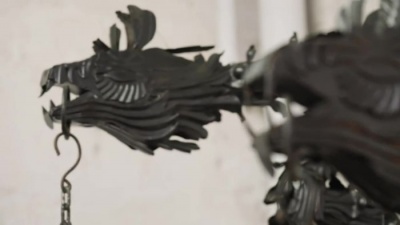 Hope they can sell these to someone making an escape room themed around The Adventure Game.
Hope they can sell these to someone making an escape room themed around The Adventure Game.
Each person has their own ideas, sees things they might like to offer. Eventually, each dealer buys something – or some things, it's perfectly legitimate to suggest the wall be decorated with horseshoes from Horsham, poles from Polesworth, crossed axes from Axminster, and a fern brush from Crapstone.
Late in part three, the first civilian comes back in to look at both sets of ideas. The expert tries to sell the concept, explain how this collection of slightly weathered enamel signs will make your house look even better. Even though the expert has never seen the inside of your house (apart from the picture you showed in part one), he knows it'll be better with a Quillies Cold Lozenges sign from 1932.
As with all things in a capitalist society, it all comes down to money. How much will the dealer charge for this arrangement? As a rule of thumb, it's about twice the price they originally paid for the item – so the £300 stone might have a starting offer of £600. Which will the civilian choose? "I have to go with my gut instinct, and my gut instinct is..."
We'll take a break. It's the most obvious, most infuriating, most utterly predictable position for a break since Noel Edmonds last left his Dream Factory.
Back on the show, the civilian has their preferred item, and there's going to be a bit of haggling between setter and dealers. Always with the possibility that the civilian might start negotiating with the other dealer – though there seems to be a rule that the other dealer cannot jump in, they have to be invited to participate.
In the end, one of the dealers clinches the sale, and a tidy profit. The other person has an unsold dragon they'll have to try and get rid of some other way.
Repeat all this for the second deal, show the winning pieces in place, and then we'll take the end credits.
The Great Antiques Challenge goes out in primetime – it's premiered at 9pm on Monday evenings – and it's an entirely watchable programme. A little insubstantial for this column's liking, but then so is The Bidding Room. And The Great Antiques Challenge is a lot more filling than the other show we're reviewing this week...
The Vintage French Farmhouse
Ricochet for BBC1, from 25 September
Remember how the folk from The Bidding Room like to hang out together? They even go on holiday together. And – even on a break – they just cannot stop themselves from doing the antiques trading thing. Goodness, sit by the pool, enjoy The Bidding Room chateau in the Loire, and do something different. Perhaps write some The Bidding Room fanfic, of which there is absolutely none to be found.
But no, our team are going to go into town, buy some stuff at the local flea market, and sell it online. The day job, but some place unusual. A brisk 75-second explainer tells us this, in lieu of a proper title sequence.
Only three of the team will take part in today's programme, we can be sure that the others will have their moments in the sun elsewhere during the series. They're allowed to buy a maximum of two items from traders at the market.
Mais nous avons un petit problem. Les tradeurs sur le marche parlent français, mais les anglais parlent anglais seulement. (Du moins, nous pensons qu'ils parlent anglais, mais nous n'en sommes pas tout à fait sûrs. Ils ne sont pas très bons dans cette langue, quelle qu'elle soit.)
Yes, the holidaying dealers barely speak a word of French, and we're not exactly convinced they always speak English. Honestly, did they not swot up with Language Learning Owl before setting out? But with a little bit of typing on their phones, and the way many of the local traders have un peu d'anglais, they can parlez enough to work around le languagebarrier.
At some point during the outdoors filming, there's also a very brief bit about the history and culture of the place where they are today. This is crowbarred in with all the subtlety of a housebrick.
Another element is crowbarred in with even less subtlety. One of the players sets the other two a challenge. In our sample episode, it's "buy something multi-purpose with lots of uses". What is the point of this extra challenge? It's not made very clear at this time, maybe all will become clear later.
So the buying goes on. A pair of carved wooden bookends in the shape of a woodpecker characters from Don Quixote. Would you pay € 60 for thirteen decoy ducks? Vous devez quackers être! The amounts of money are translated from euro into pounds sterling at the exchange rate when these episodes were filmed in summer 2022 (roughly £1 = € 1,10). The reason for this will become clear later.
All of this shopping takes up the first third of the show, and then they load the items into the van and return to the titular farmhouse where everyone's staying. (The farmhouse itself has very little to do in the show, but they evidently want to invoke the sense of place from The Bidding Room and The Repair Shop and The Crafting Conservatory.) Our players brag about their purchases to each other – and try to justify why the things meet the criteria. Does a bench have lots of uses?
According to Nigel Havers' narration, nobody goes out to antiques shops and markets any more. This will come as a surprise to a lot of people – not least the dealers, because they've literally just gone out to a market and bought some things. Nevertheless, let's give old Nigel the benefit of the doubt, and let the dealers sell their goods online.
There's a very long section where the dealers work out how to sell their goods for the best effect. Dress the set, put spooky things in a vaguely autumnal scene. Hang big things on the washing line, to show the scale and let the sunlight catch them. Perhaps they might touch up the bench, or varnish it to make sure there are no woodworm.
And there are some "tips" on how to sell things online. The voiceover declares portentiously, "the more hashtags you have, the greater the chance someone will find your post". While this may have been true at the time of recording, it's since changed – most instances now support full-text search, if you want it
Anyway. After ten minutes of photography, it's time to post online. Our dealers have just 24 hours to sell their items, and whoever makes the most profit from the items they do sell is going to be today's winner. Sales are mostly to people who use the pound sterling as their local currency, hence the conversion earlier.
Once the items go online, there's a cut to exterior shots, and a recap of everything being sold. Rarely have we seen a more obvious stop-and-reset. It's obvious that they're going to put a break right here when this goes out on UKTV OldStuff+1, and on the inevitable The Bidding Room FAST channel. (Was this show made with at least one eye towards making enough programmes – and enough varied programmes – to populate a The Bidding Room online-with-ads stream? The thought entered our mind, and cannot be dismissed.)
There then follows a rather dull ten minutes of talking more about the items, and some more selling stuff. A few of the items are snapped up before the 24 hours expires, others are up for auction amongst the dealers' regular viewers. Each dealer has their area of expertise, and knows that they can attract people who will buy handmade paper or whatever it is they've picked up.
Six minutes left in the show, and we all repair to the kitchen. Over a plate of wine and a glass of local cheese, our trio discuss what happened. Who made the money, who sold stuff, who is today's winner. Did they ever resolve the question about multi-functional devices? Not to our satisfaction, it was just left as a challenge during the purchasing bit and then gently forgotten about.
The Vintage French Farmhouse is all a bit anticlimactic, the show peters to a conclusion without ever raising the drama above "this is a thing happening". Selling things online does not make for good television, it's mostly people pleading with their fans to do something. The "reveal" is numbers plucked out of the air, represented only as numbers on screen, not by notes and coins in the hand.
Crucially, we've never had any sense of jeopardy from The Vintage French Farmhouse. Decisions on The Great Antiques Challenge can surprise us, but even this surprise is missing on the BBC's show.
In other news
Hayla, Maisie, and Yazmin are Stand Uniqu3. They'll represent the BBC at the Junior Eurovision Song Contest in Nice next month with "Back to life", written by Sky Adams, Jakke Erixson and Jack Hawitt. The entry is a bop, had us humming along during the first listen, and we're always in favour of some close harmonies. Nail those on the night, have some good choreography, and they could go far. Good luck to the trio, we'll be cheering from the comfort of our sofa.
The International Format Awards took place this week, as part of the MIPCOM junket in Cannes. Games and game-ish winners:
- The Piano, best reality format.
- The 1% Club, best studio-based game show format.
- Destination X, best competition reality format, and best multi-platform format. Coming soon to BBC1.
- Finder$ Keeper$, best comedy format.
- Lego Masters, best returning format.
Quizzy Mondays
Rob Jones doesn't go to extremes. He was down with Billy Joel, and went up the Mastermind scoreboard to 24. He may not have started the fire, but had to wait the longest time to win, as Steve Barnes and Martin Hoskins had contributed great general knowledge rounds. Next stop: Leningrad? Or is it all about Seoul?
Thrifters won Only Connect, with a spectacular beginning to Missing Vowels. Antiphons had a lovely technique on the wall, working their way through a six-option group. Both teams acquitted themselves well when singing "RESPECT"; it's no shade to say they're not Aretha Franklin. Thrifters had the better of bonuses, picking up events in Squid Game and "this is not a ____" slogans. Thrifters through to the quarter-finals, Antiphons get another chance.
York booked the final ticket in the University Challenge knockout round, beating Northeastern University of London by 190-120. "Plenty of time" said host Amal Rajan at about ten minutes, and Northeastern recovered from 70 down to go 20 ahead. That was as good as it got – York had been better on the buzzer at the start, and proved better at the end. Not sure how far this team will go, there seemed to be a lot of passes on the bonus questions.
Quiz digest
Things we've seen and heard that are interesting, notable, and the sort of thing that a good pub quiz might ask eventually.
- There are 11 key changes in Tommy Roe's song "Dizzy". When the song was covered by Vic Reeves and The Wonder Stuff, they managed to squeeze in another modulation. 12 key changes, that's one for every semitone in the octave! Even more than a good locksmith! (Paul Sinha's Perfect Pub Quiz)
- The "best before" date for most crisps is a Saturday. Rather than change the date every single day, the crisp makers set it to the Saturday at the end of the week, 11 weeks and a few days after the crisps were made. Why Saturday? Some have suggested (but we've not been able to find a second source) that pubs traditionally rotated their stock of dry goods on Friday, so crisps and other snacks can be sold as they approach their best before day. (Telegraph Pub Quiz)
ITV's new casting show begins on Sunday. MAMMA MIA! I Have a Dream seeks someone for another hit musical. There's also a new edition of Stephen Mulhern's Celebrity Catchphrase, so be careful.
Over on BBC1, Masterchef the Professionals kicks off on Monday. Satellite viewers get A League of Their Own on Wednesday.
The long-awaited third series of Survivor starts on Saturday. It's on a new channel – BBC1, not the ITV network – and Mark Durden-Smith has transformed into Joe Lycett. Second episode's next Sunday.
Pictures: Ricochet, BBC
To have Weaver's Week emailed to you on publication day, receive our exclusive TV roundup of the game shows in the week ahead, and chat to other ukgameshows.com readers, sign up to our Google Group.


